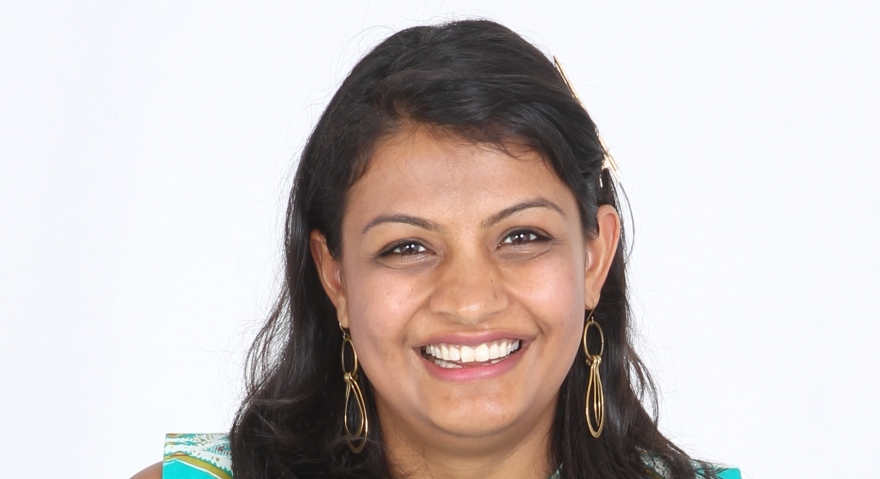BLOG_2017_06_07_MEET SHRUTI
MEET SHRUTI...
07 June 2017

The LEAP Network salutes Shruti Shah.
Shruti is the co-founder of Arama, a senior citizens care and recreational facility in Nairobi, Kenya. Shruti has a big heart and big dreams to impact the lives of the people most tend to dismiss or even forget about in society.
1. Why did you name your business Arama?
We liked the sound of it and it has a beautiful meaning. Arama is a multifaceted word - in Maori it means SPRING and in Hindi and Gujarati, the word ARAM means RELAXATION. We intend to set up the Arama Centre with this in mind - to provide the feeling of spring and renewal in a relaxing, calm environment.
2. You are an actuary; running a senior care centre isn’t a natural career progression for an actuary. How did that happen?
Once an actuary, always an actuary! Well, the change in career isn’t as drastic as it may seem. I’ve spent most of my actuarial career working within the pensions and social security arena. So even though the shift isn’t a natural progression, there is some connection. We founded Arama because we identified a gap in the market - a gap that keeps growing and is likely to grow even bigger with the changing demographics. We felt that whilst Nairobi is abuzz with new restaurants, events and things to do, and lots of new creative ways to entertain little children, senior care services and senior entertainment are scarce and difficult to find. Most seniors are heavily dependent on family and staff members and in terms of entertainment, most depend on what their community offers. We feel passionate about this cause and believe that it is possible to improve the status quo of our senior citizens.
3. You have always been drawn to charity and giving back to the community, why do you think it is important?
I’ve always felt fortunate that I’ve been born into a comfortable setting – we’ve always had enough food in our pantry and fridge, running water, a warm cozy bed and a stable roof over our heads. I was lucky that my parents had ensured they had sufficient savings for my education and have supported me throughout. As we were growing up, my parents made a deliberate effort to remind us that there are people out there who aren’t as lucky as we are. The mama mbogas and askaris, of this world, and those with fewer privileges than them.They also reminded us that we could make small changes in our lives which would make massive differences to others e.g. instead of going out for dinner one evening we could buy a month’s supply of groceries for our nanny.
4. Why do you think geriatric care isn’t something that people talk or even think about in Kenya?
As Kenyans we still depend on the traditional forms of social protection: we take care of our children and grandchildren and once they are able enough they take care of parents, parents-in-law, grandparents and spouses – it’s almost like a full circle. Whilst this would be great in an ideal world, often it is not possible – changes in family structures, people moving abroad, busy work and social schedules makes it more difficult. In addition, our life expectancy was generally not that long but now people are living longer – globally and even in Kenya. So there is a need to start thinking about geriatric care.
5. What differentiates Arama from other senior care centres in Kenya?
Arama aims to offer a convenient, secure and homely environment for seniors to come spend a few hours, a few days or the rest of their lives. One of our biggest differences is our flexible service offering – we cater our service to the individual’s needs, circumstances and preferences – from food, activities, type and level of care.
6. How soon will Arama open and where will it be located?
Arama’s first centre is based in Westlands and we’re hoping to raise the curtains by August 2017.
7. What are your biggest hopes for Arama?
We would love to expand and have centres in various geographic locations. Eventually, the aim is to build an Arama Retirement Village – which would encompass various facilities. The biggest hope is to help every Kenyan age gracefully and with dignity.
8. What are some of the things that you have learned in the process of setting up the business?
We’ve learnt the A.B.C: Assume nothing Believe no one – make sure you get everything in writing! Check everything. Patience and perseverance are also key tenets which we’ve developed.
9. How do you intend to go about your marketing?
We’re in the process of setting up our website and social media sites and will use these for online marketing. We may also consider some traditional forms of marketing – newspaper adverts etc. However, initially we will be reliant on the most traditional form of marketing ever – word of mouth.
10. What is your advice to entrepreneurs more interested in running a social enterprise as opposed to conventional for-profit corporations?
Take the LEAP! If you feel like you’ve got a great idea for a social enterprise/social impact business – do it! There are lots of different programmes and funds who would support you and guide you. Renee has also been really helpful in guiding us. So don’t be afraid – believe in your idea and do it! It’s never too late!
